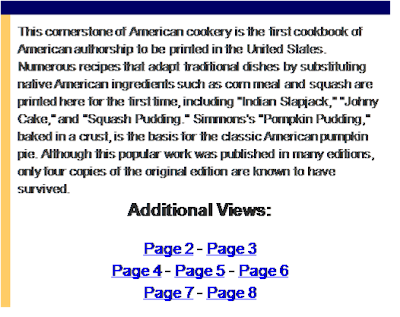 |
| ZUCCA TURBANTE DIFELTOSA – FILE PIC CUCURBITA PEPO. File from Wikimedia Commons Photo: Opra Propria Author: Wildfeuer |
A SQUASH BREAD RECIPE- AFTER LIST ON GUEST POSTS BELOW
Excerpts from everyday mysteries- http://www.loc.gov/
Excerpts from Squash Food Resource Oregon State University – http://food.oregonstate.edu/
How did the squash get it’s name?
Answer: "Squash" comes from the Narragansett Native American word askutasquash, which means "eaten raw or uncooked."
Squashes are one of the oldest known crops--10,000 years by some estimates of sites in Mexico. Since squashes are gourds, they most likely served as containers or utensils because of their hard shells.
-Pre-Columbian Indian in both South and North America- The seeds and flesh became an important part of their diet
-Northeastern Native American tribes grew pumpkins, yellow crooknecks, patty pans, Boston marrows (perhaps the oldest squash in America still sold), and TURBANS.
-Southern tribes raised winter crooknecks, cushaws, and green and white striped sweet potato squashes.
- Native Americans roasted or boiled the squashes and pumpkins and preserved the flesh as conserves in syrup. They also ate the young shoots, leaves, flowers, and seeds
-Virginia and New England settlers adopted squash and pumpkins as staples, to survive the harsh winter. Squashes were baked, cut and moistened with animal fat, maple syrup and honey.
Squashes come in many different shapes and colors including tan, orange, and blue. There are many kinds of squashes, all part of the genus Cucurbita (Family Cucurbitaceae).
The terms pumpkin, winter squash, and summer squash have been applied to fruits of different species.
• Cucurbita maxima (round, thick stems) are winter squash (buttercup, Hubbard, turban, winter pumpkins). Usually larger fruit with hard seeds, they ripen in the fall. We have to peel them. They can be stored for several months.
• C. moschata (round stems) are also winter squash such as butternuts, musky winter squash, and the cushaw.
• C. pepo (pentagonal, prickly stem) are summer squash: zucchini (Italian for sweetest), marrow, courgette (French), yellow squash, ornamental gourds, crookneck, spaghetti squash, and summer pumpkins. Usually soft edible shell and seeds, they ripen in summer and need to be eaten soon after harvest.
For pies, ancient Pilgrims first hollowed out a pumpkin, filled it with apples, sugar, spices and milk, then put the stem back on and baked.
Squash bees are very common, often the dominant pollinators of many wild squashes
From South America to Africa to India and Asia and even in some parts of the United States, no single food provides a greater percentage of certain carotenoids than WINTER SQUASH.
One of the first published recipes for pumpkin pie (Pompkin Pudding) was in Amelia Simmons’ 1796 cookbook, American cookeryhis was the first cookbook to be written by an American and published in the United States- http://www.loc.gov/exhibits/treasures/tri054.html
 |
| Simmons Amelia American Cookery 1796, Grand Rapids- Recipe on “Pompkin” a dough fpu, crof and chequer it and baked in difhes three quarters of an hour” is on page 4. |
1. Education - Where2
2. Writers and Poets- Woman 724, Ana Luiza, Balqis, Neilieta, Carol Wyers,
Fantacy and practicality, Beader Bubbe
3. Photography and Art gallery- Alfandi , SA Wedding & Event
4. Foodie- Nava-k, Shobha, Neilieta, Ayeesha, Umm Maimoonah, Mehjabeen
5. Cartoons-, Speedy and Klaat, Sardonic salad, Cindy Paul
6. Travel- Neilieta
7. Bloggers club- Rajee
Pumpkin bread- delicious to eat hot and fresh.
Tho’ cinderella might not agree,
cooking-varieties says it’s lu v verlyy.. ! ! !
RECIPE ON HOW TO MAKE SQUASH BREAD
Equally delicious for breakfast, snack or as a light dessert, this honey sweetened loaf can be spread with low-fat cream cheese or whipped butter. To warm: Wrap thick slices in a paper towel and microwave for 15 to 20 seconds on high.
2 cups all-purpose flour
1 teaspoon baking soda
1/2 teaspoon salt
1 teaspoon ground cinnamon
1 teaspoon ground ginger
1/4 teaspoon ground nutmeg
1/4 cup butter or margarine
1 cup sugar
1/2 cup honey
1 egg plus 1 egg white
1 1/4 cup pureed cooked winter squash
1. On a plate, sift together first six ingredients. Set aside
2. In a large bowl, mix oil, sugar and honey together until light and fluffy.
3. Beat in egg and egg white. Add squash puree and beat until smooth.
4. Fold in dry ingredients. Turn into a greased 9x5 inch loaf pan.
5. Bake until golden brown and a wooden skewer inserted in the center comes out clean, about one hour. Remove from the oven, let stand in pan 10 minutes. Turn out onto a wire cooling rack or cake plate to cool. Sprinkle with powdered sugar.
Variation: Squash Bread with Nut Topping
2 tablespoons melted butter or margarine
1/2 cup finely chopped pecans or walnuts
Powdered sugar for dusting (optional)
Next, pour melted butter over the top and sprinkle with chopped nuts. Bake as directed above. Cool and dust with powdered sugar
Cooking-varieties published this recipe from “Squash Food Resource, Oregon State University” in honor of their efforts and dedication.
Our special thank you to The George Mateljan Foundation, a not-for-profit foundation with no commercial interests or advertising- is a new force for change to help make a healthier you and a healthier world.

No comments:
Post a Comment